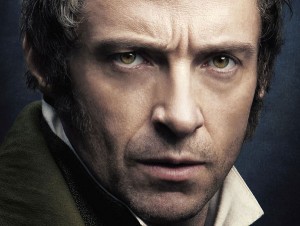Les Misérables
Posted on December 24, 2012 at 6:00 pm
Fair warning: I seem to be impervious to the appeal of “Les Misérables.” I was not a fan of the stage show or the songs, but I understand that it is the most popular musical of all time, and I approached this movie version with an open mind. My take is that it will make the fans happy, but I am still unpersuaded.
The musical is based on Victor Hugo’s vast novel about Jean Valjean (a magnificent Hugh Jackman), who served 19 years in prison for stealing a loaf of bread to feed his family and spends the rest of his life trying to do good and to avoid the relentless pursuit of Police Inspector Javert (Russell Crowe), who is trying to put him back in prison for violating his parole.
When Valjean is first set free, he is bitter and angry. He repays the kindness of a priest who tries to help him by stealing valuable silver treasures from the church. Immediately captured, he is returned to the priest (played by Colm Wilkinson, the foremost Valjean in the stage version). But the priest insists that the items were gifts, and with the police watching, he encourages Valjean to take more. Valjean is transformed by this compassion and generosity, and he vows to be as good, loving, and devoted to helping others as the man who cared for him.
Years later, Valjean, under another name, is prosperous and public-spirited. He owns a factory and he is mayor of his town. Fantine (a heart-breaking Anne Hathaway) works in his factory to support a daughter she boards with an innkeeper and his wife. She loses her job because she refuses to sleep with a foreman and is forced into prostitution. Valjean is horrified and feels responsible. As she lies dying, he promises to care for her daughter, Cosette.
Valjean rescues Cosette from the corrupt innkeeper (Sasha Baron Cohen) and his wife (Helena Bonham-Carter). But he has attracted the attention of Javert, and so he and Cosette must hide. Ten years later, with Paris in the upheaval of a revolution, an idealistic young man named Marius (“My Week with Marilyn’s” Eddie Redmayne) sees Cosette (Amanda Seyfried) and instantly falls in love with her. In the midst of uprisings and violent reprisals, Valjean tries to keep his promise to Fantine and keep Cosette safe and happy.
 Production designer Eve Stewart has done a masterful job, making the setting as vibrant and as essential to the story-telling as any of the characters. Director Tom Hooper (“The King’s Speech”) made a critical contribution by having the actors sing their parts while they were filming, instead of pre-recording them to be played back when the movie was being shot. Since the movie is “sung-through” (all dialogue is sung rather than alternating speaking and singing), this gives the music a welcome organic quality and immediacy. Hathaway’s character is on screen for only a brief time, but her big number, the “I Dreamed a Dream” song memorably sung by Susan Boyle, is wrenching. Hooper keeps the camera on her beautiful face, like the “Nothing Compares 2 U” Sinead O’Connor video, the better to feel her anguish, and it is a stunning moment. Elsewhere, he over-does the artsy angles and sometimes assumes too much familiarity with the storyline. Crowe’s voice is not up to the task and Seyfried’s is stretched beyond its capacity. Newcomer to film Samantha Barks (from the London cast) as Eponine, the daughter of the innkeepers who also loves Marius, sings like an angel and lights up the screen.
Production designer Eve Stewart has done a masterful job, making the setting as vibrant and as essential to the story-telling as any of the characters. Director Tom Hooper (“The King’s Speech”) made a critical contribution by having the actors sing their parts while they were filming, instead of pre-recording them to be played back when the movie was being shot. Since the movie is “sung-through” (all dialogue is sung rather than alternating speaking and singing), this gives the music a welcome organic quality and immediacy. Hathaway’s character is on screen for only a brief time, but her big number, the “I Dreamed a Dream” song memorably sung by Susan Boyle, is wrenching. Hooper keeps the camera on her beautiful face, like the “Nothing Compares 2 U” Sinead O’Connor video, the better to feel her anguish, and it is a stunning moment. Elsewhere, he over-does the artsy angles and sometimes assumes too much familiarity with the storyline. Crowe’s voice is not up to the task and Seyfried’s is stretched beyond its capacity. Newcomer to film Samantha Barks (from the London cast) as Eponine, the daughter of the innkeepers who also loves Marius, sings like an angel and lights up the screen.
It’s a long slog at nearly three hours, for a non-Miz-head. But I came away with more understanding of those who are.
Parents should know that this is an epic story of struggle against oppression with disturbing and graphic abuse of prisoners and others, many characters injured and killed, sad deaths (including death of a child), and a woman accused of sexual misconduct and forced into prostitution.
Family discussion: How does the priest change Jean Valjean’s notion of what he should do? Why was Javert so conflicted? Why were the rebels willing to risk their lives?
If you like this, try: the PBS concert specials saluting the 10th and 25th anniversaries of the musical and the non-musical film versions


Are you going to see Django Unchained?
Yes, review is now up, thanks!
I’m glad to see you recommend this for high school and up. I almost took my 12 y old and was so relieved I hadn’t (and thought a few times that I wished I’d left my 14 at home). This is more a PG-15 movie,especially with Fantine’s descent into sordid (graphic) survival.
Such a great adaptation, such a wonderful movie experience- but not for younger kids.
As always, thanks for your reviews, Nell!
My pleasure, Jessica! Thanks so much for the kind words — you made my day!
Two disappointments:
Russell Crowe … cannot … sing! (Frankly, I thought that, physically, Crowe and Jackman’s roles should have been switched, but the the singing is an even bigger problem.)
They dropped the ball with the Thenardiers – which I was afraid of, because they were barely featured in any of the teasers or trailers. Sasha Baron Cohen is the only character in the movie affecting a French accent, apparently for comic effect. His brief appearance in the sewer is confusing, partly because they dropped a song he performs there that portrays him as vicious, not comic (“Dog Eat Dog”). The Thenardiers’ final song is at complete odds with what is happening in the story (changed from both the stage musical and the novel.)
In the novel, Thenardier is actually the character that is the Dickensian link to all the other characters:
> He saves Marius’s father’s life after the Battle of Waterloo – by robbing him.
> He takes in Cosette.
> He has to elude Javert after trying to blackmail/rob Valjean.
> He is Eponine’s father.
> He is also Gavroche’s father – an element left out of the musical.
Very astute comments, Kevin! I felt the movie was designed for people who were already fans and those glosses over some key plot elements, assuming they are already understood.
The movie actually restored plot elements left out of the play:
> Valjean and Cosette finding refuge at a convent.
> Marius’ grandfather is included (resolving a major plot hole in the play – where did all the wedding guests come from?)
> Gavroche’s living in the elephant monument – although Hugo’s symbolism for it is lost.
But even that still only scratches the surface of the novel:
>Marius’ father is an important character, in terms of explaining Marius’ motivations.
> The father’s neighbor is a sub-plot of his descent into poverty, culminating on the barricade.
> Valjean is recaptured, sent to prison, and escapes again, while Cosette is being educated at the convent.
Dickens had NOTHING on Victor Hugo for plot twists and coincidences.
Very intriguing, Kevin, thanks! Remarkable how much of a 1000+ page novel they cover.